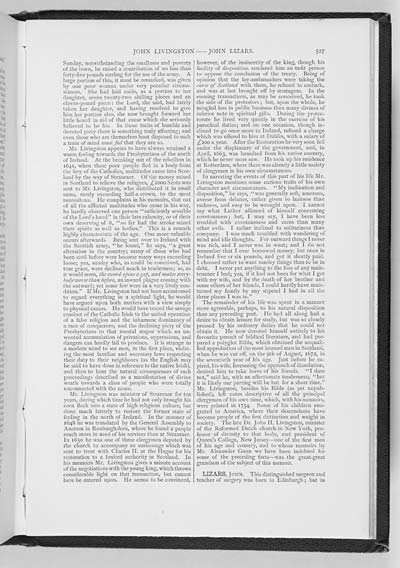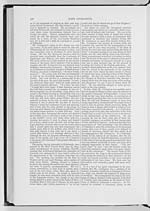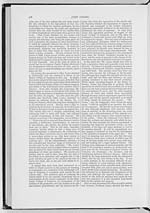527
Sunday, notwithstanding the smallness and poverty
of the town, he raised a contribution of no less than
forty-five pounds sterling for the use of the army. A
large portion of this, it must be remarked, was given
by one poor woman under very peculiar circum-
stances. She had laid aside, as a portion to her
daughter, seven twenty-two shilling pieces and an
eleven-pound piece: the Lord, she said, had lately
taken her daughter, and having resolved to give
him her portion also, she now brought forward her
little hoard in aid of that cause which she seriously
believed to be his. In these traits of humble and
devoted piety there is something truly affecting; and
even those who are themselves least disposed to such
a train of mind must feel that they are so.
Mr. Livingston appears to have always retained a
warm feeling towards the Presbyterians of the north
of Ireland. At the breaking out of the rebellion in
1641, when these poor people fled in a body from
the fury of the Catholics, multitudes came into Scot-
land by the way of Stranraer. Of the money raised
in Scotland to relieve the refugees, �1000 Scots was
sent to Mr. Livingston, who distributed it in small
sums, rarely exceeding half-a-crown, to the most
necessitous. He complains in his memoirs, that out
of all the afflicted multitudes who came in his way,
he hardly observed one person "sufficiently sensible
of the Lord's hand" in their late calamity, or of their
own deserving of it, "so far had the stroke seized
their spirits as well as bodies." This is a remark
highly characteristic of the age. One more valuable
occurs afterwards. Being sent over to Ireland with
the Scottish army, "he found," he says, "a great
alteration in the country; many of those who had
been civil before were become many ways exceeding
loose; yea, sundry who, as could be conceived, had
true grace, were declined much in tenderness; so, as
it would seem, the sword opens a gap, and makes every-
body worse than before, an inward plague coming with
the outward; yet some few were in a very lively con-
dition." If Mr. Livingston had not been accustomed
to regard everything in a spiritual light, he would
have argued upon both matters with a view simply
to physical causes. He would have traced the savage
conduct of the Catholic Irish to the united operation
of a false religion and the inhumane dominancy of
a race of conquerors; and the declining piety of the
Presbyterians to that mental stupor which an un-
wonted accumulation of privations, oppressions, and
dangers can hardly fail to produce. It is strange to
a modern mind to see men, in the first place, violat-
ing the most familiar and necessary laws respecting
their duty to their neighbours (as the English may
be said to have done in reference to the native Irish),
and then to hear the natural consequences of such
proceedings described as a manifestation of divine
wrath towards a class of people who were totally
unconnected with the cause.
Mr. Livingston was minister of Stranraer for ten
years, during which time he had not only brought his
own flock into a state of high religious culture, but
done much latterly to restore the former state of
feeling in the north of Ireland. In the summer of
1648 he was translated by the General Assembly to
Ancrum in Roxburghshire, where he found a people
much more in need of his services than at Stranraer.
In 1650 he was one of three clergymen deputed by
the church to accompany an embassage which was
sent to treat with Charles II. at the Hague for his
restoration to a limited authority in Scotland. In
his memoirs Mr. Livingston gives a minute account
of the negotiations with the young king, which throws
considerable light on that transaction, but cannot
here be entered upon. He seems to be convinced,
however, of the insincerity of the king, though his
facility of disposition rendered him an unfit person
to oppose the conclusion of the treaty. Being of
opinion that the lay-ambassadors were taking the
curse of Scotland with them, he refused to embark,
and was at last brought off by stratagem. In the
ensuing transactions, as may be conceived, he took
the side of the protestors; but, upon the whole, he
mingled less in public business than many divines of
inferior note in spiritual gifts. During the protec-
torate he lived very quietly in the exercise of his
parochial duties; and on one occasion, though in-
clined to go once more to Ireland, refused a charge
which was offered to him at Dublin, with a salary of
�200 a year. After the Restoration he very soon fell
under the displeasure of the government, and, in
April, 1663, was banished from his native country,
which he never more saw. He took up his residence
at Rotterdam, where there was already a little society
of clergymen in his own circumstances.
In narrating the events of this part of his life Mr.
Livingston mentions some curious traits of his own
character and circumstances. " My inclination and
disposition," he says, "was generally soft, amorous,
averse from debates, rather given to laziness than
rashness, and easy to be wrought upon. I cannot
say what Luther affirmed of himself concerning
covetousness; but, I may say, I have been less
troubled with covetousness and cares than many
other evils. I rather inclined to solitariness than
company. I was much troubled with wandering of
mind and idle thoughts. For outward things I never
was rich, and I never was in want; and I do not
remember that I ever borrowed money, but once in
Ireland five or six pounds, and got it shortly paid.
I choosed rather to want sundry things than to be in
debt. I never put anything to the fore of any main-
tenance I had; yea, if it had not been for what I got
with my wife, and by the death of her brother and
some others of her friends, I could hardly have main-
tained my family by any stipend I had in all the
three places I was in."
The remainder of his life was spent in a manner
more agreeable, perhaps, to his natural disposition
than any preceding part. He had all along had a
desire to obtain leisure for study, but was so closely
pressed by his ordinary duties that he could not
obtain it. He now devoted himself entirely to his
favourite pursuit of biblical literature, and had pre-
pared a polyglot Bible, which obtained the unquali-
fied approbation of the most learned men in Scotland,
when he was cut off, on the 9th of August, 1672, in
the seventieth year of his age. Just before he ex-
pired, his wife, foreseeing the approach of dissolution,
desired him to take leave of his friends. "I dare
not," said he, with an affectionate tenderness; "but
it is likely our parting will be but for a short time."
Mr. Livingston, besides his Bible (as yet unpub-
lished), left notes descriptive of all the principal
clergymen of his own time, which, with his memoirs,
were printed in 1754. Some of his children emi-
grated to America, where their descendants have
become people of the first distinction and weight in
society. The late Dr. John H. Livingston, minister
of the Reformed Dutch church in New York, pro-
fessor of divinity to that body, and president of
Queen's College, New Jersey�one of the first men
of his age and country, and to whose memoirs by
Mr. Alexander Gunn we have been indebted for
some of the preceding facts�was the great-great
grandson of the subject of this memoir.
LIZARS, JOHN. This distinguished surgeon and
teacher of surgery was born in Edinburgh; but in

![]() Universal Viewer |
Universal Viewer | ![]() Mirador |
Large image | Transcription
Mirador |
Large image | Transcription
![]()

